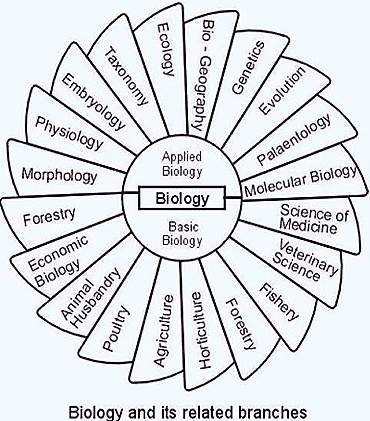【Introduction - Biology】Some people say that this studying this major provides for a promising future, while others say that this major can only be completed through scientific research. The topics to be discussed here include:
- Introduction to Biological Sciences
- Who this Major is Suitable For
- Job Prospects After Graduation
- Opinions of Netizens on the Major of Biological Science (Pros vs. Cons)
- Courses Offered in the Biology Major
- UtoCanada’s Recommendations

Introduction to the Canadian Bioscience Major:
Biology is the study of all living things, the development process of each, and their relationship with the environment. Because organisms include plants, animals, insects, marine life, and microorganisms, so plant science, animal science, entomology, marine biology, ornithology, biological engineering, etc. are all branches of biology.
Many undergraduate biology courses involve intensive laboratory research activities. In these courses, you will learn practical skills, such as the proper use of scientific equipment, and various techniques for investigating living organisms and their functions.
Who Biology is Suitable for
People who love science and want to develop in scientific research.
Students who are patient, passionate about research, curious about animals and plants, and like to study and analyze.
Employment prospects/directions after graduation
"As a biology graduate, what salary can I earn?"
The salary you can earn as a biology graduate depends on the career you are pursuing. For example, if you advance to be a university professor, your income may be different from the income you received when you chose to become a food and drug inspector.
Other factors that determine how much you can earn include (not inclusive):
- Your education level (such as whether you continue to study for a graduate degree)
- The industry in which you are employed
- Type of job you have
- The size and type of company
- The location where you work
- Other work experience you have
- Other skills you may have
In addition, biology graduates can choose from many careers, such as working in the food industry, agriculture, medicine, health sciences, pharmaceutical industry, and brewing industry.
- Chemical, pharmaceutical and biotechnology companies
- Companies in the agriculture, food, natural resources and utilities industries
- Environmental and engineering consulting companies
- Federal, provincial/state and local government departments and agencies
- Educational and scientific research institutions such as universities and research institutes
- Medical and veterinary research institutions (If you plan to become a veterinarian, you need to study veterinary medicine for another 4 years)
Where can I work after graduating from Biological Sciences in Canada?
A biology degree can help you prepare for a variety of biology-related careers, such as environmental and biological sciences, biotechnology, or medicine… Here are some examples:
- Chemical, pharmaceutical and biotechnology companies
- Companies in the agriculture, food, natural resources and utilities industries
- Environmental and engineering consulting companies
- Federal, provincial/state and local government departments and agencies
- Healthcare and educational institutions such as hospitals and universities
- Medical and veterinary research organizations...
Courses Offered in the Biology Major
With the diversity of living things, there are also many things in common. Usually, an undergraduate biology program teaches students about various biological concepts along with basic knowledge in the first two years. During this period, students can also choose a professional field in biology according to their interests. In fact, the subdivided courses in the next few years are based on these concepts and technologies.
The core courses required for the undergraduate stage are all basic subjects/core courses:
- Cell Biology
- Microbiology
- Immunology
- Chemistry
- Biochemistry
- Cell and Molecular Biology
- Genetics
- Ecology
- Statistics
- Molecular Biology
(Refer to theUniversity of Toronto Biology Courses)
The core courses of the master's program are:
- Molecular, cellular and tissue biomechanics
- Cell matrix mechanics
- Biomolecular and cell dynamics
- Field in biological system
- Force and flow
- Bionetwork analysis
- Biomaterials and tissue reaction
- Design and application of medical equipment
- Molecular principles of biological materials
>>Three levels of education in biology: college,
Traditionally, Canadian biologytraining can be obtainedin three forms:
- Professional diploma:generally 2-3 years
- Bachelor's degree in biology:generally 4 years to complete
- Graduate degree in biology:generally 2 years to complete
The top 10 universities are:
According toMacLean’s magazine's ranking of the hottest Canadian universities, the top 10 universities are:,排名前10的学校有:
1、University of Toronto(Biology major )
2、 UBC(Biology major, University of British Columbia)
3、 McGill University(Biology major)
4、University of Alberta(Biology major )
5、McMaster University(Biology major )
6、Univerity of Guelph(Biology major, University of Guelph)
7、 Dalhousie University(Biology major)
8、University of Calgary(Biology major )
9、Queen’s University(Biology major)
10、Simon Fraser University(Biology major, Simon Fraser University )
UtoCanada’s Thoughts
Many people say that biology is a "sunrise industry," but many graduates' job-hunting experiences suggest otherwise, because a lot of work in biology stays at the research stage, not the application stage. Many netizens actually stated correctly that most of the students who chose the biology major, who can achieve professional counterparts are basically postgraduates. I, personally, graduated from botany and struggled to find a job for many years. My classmates in the same major are really eager to study for their Ph.D.
If you don't want a PhD but really want a job, co-op, internships, and field placements can help you land one.
Photo From:
http://www.biozoomer.com/2010/11/biology-branches.html
















